In April 2017, the President signed into law the Weather Research and Forecasting Innovation Act. This Act required establishing an Interagency Committee for Advancing Weather Services -- The Interagency Council for Advancing Meteorological Services (ICAMS) meets this requirement. ICAMS serves to improve coordination of relevant weather research and forecast innovation activities across the United States Government. Sixteen various Departments and Agencies comprise ICAMS, including NSF, NOAA under the DOC and NASA.
Better coordination among federal agencies and expanded partnerships with the weather enterprise will foster improved weather, water, and climate information for the American public, ensuring US leadership in the world in meteorological services via an Earth-system approach, providing information that directly benefits society. ICAMS, chartered July 2020, was championed by US government administrative leaders, at that time, Dr. Kelvin Droegemeier and Dr. Neil Jacobs. Note that ICAMS replaces the former Office of the Federal Coordinator for Meteorology and the former National Earth System Prediction Capability with a section on the ICAMS resource webpage that bridges the past and present.
The work of the ICAMS is organized under four primary committees:
- Committee on Observational Systems – Coordinates all relevant land/air/ocean/space-based observation systems and associated data capabilities for meteorological research and services.
- Committee on Cyber, Facilities, and Infrastructure – Coordinates all relevant computing, data, networking, and security elements for operations and research.
- Committee on Services – Coordinates meteorological services encompassing weather, climate, hydrological, ocean, and related environmental services. Services include all relevant activities that provide value to society whether over land, at sea or in the air.
- Committee on Research and Innovation – Coordinates an Earth system approach to advance meteorological services including definition of research topics, community engagement, coordination among research organizations, engagement of multi-sector enterprise to maximize technological innovation, creation of new modalities/processes/efficiencies, building collaborations, and pursuing frontier capabilities.
